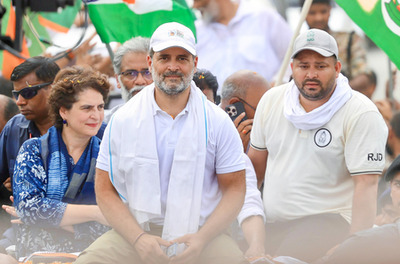New Delhi, Oct 26 (IANS) The results of the Bihar Assembly elections are set to be announced on November 14, but the politics leading up to it has already exposed Congress leader Rahul Gandhi in an unflattering light.
Bihar's politics has long been seen as a mirror reflecting the emerging national narrative. It captures grassroots sentiment as well as a leader's ability to manoeuvre emotions and situations. This election, in particular, is shaping up to be a key indicator of the country's political direction. The signals from the ground are clear -- and hard to ignore.
The Mahagathbandhan (Grand Alliance) seems to have finally put its house in order, declaring Tejashwi Yadav as its Chief Ministerial candidate and, unsurprisingly, naming Mukesh Sahani as the Deputy CM face. The opposition alliance may now be trying to project unity and purpose for the ultimate result, but within its ranks, an unspoken verdict has already been delivered.
That internal verdict should deeply worry the Congress party -- and more specifically, Rahul Gandhi. The Grand Alliance has effectively sidelined the Gandhi scion, who had hoped to play a leading role in Bihar's elections and use that platform to challenge the BJP-led government at the Centre.
But the tide never turned in his favour.
Instead, it swept the Mahagathbandhan into a storm that ended up showing Congress -- and Rahul Gandhi -- their true place in the pecking order.
Over 16 days in Bihar, from August 17 to September 1, Rahul Gandhi undertook the much-publicised 'Voter Adhikar Yatra'. Designed as a moral crusade to "protect the vote", it was meant to spark a movement against Prime Minister Narendra Modi and the BJP.
Gandhi directly attacked the PM, using slogans like "vote chor" and "vote chori" to rally support.
He travelled 1,300 kilometres across 25 of Bihar's 38 districts, covering 110 Assembly constituencies. With the slogan "vote chor gaddi chhor", he walked dusty roads, rode motorbikes, and even had an Opposition chief minister accompany him in open jeeps.
Perhaps he imagined this campaign could echo the historic JP Movement of 1974, which began in Bihar as a student-led uprising against misrule and corruption.
However, the 16-day campaign turned out to be more of a political excursion than a mass awakening. Crowds were thin, and enthusiasm was limited. At times, RJD leader Tejashwi Yadav was seen guiding Rahul during the yatra -- while simultaneously asserting his own political individuality.
For Rahul, it was a "vote-chori" crusade, but for Tejashwi, it was an opportunity to sense the real mood of the people. And that mood was unmistakable: voters were not buying into Rahul Gandhi's narrative.
They knew their voting rights were intact, and there was no groundswell of anger on the streets. Had people truly felt their votes were being stolen, Bihar would have been up in protest. That simply didn't happen.
Rahul Gandhi may have believed his "vote chor" activism would make him Bihar's new jan nayak (people's leader), but Tejashwi and other alliance partners read the situation differently.
Their response was telling: the INDIA bloc failed to reach an amicable seat-sharing arrangement and refused to bow to Rahul's brand of activism.
Eventually, the seven-party Grand Alliance went along with the views of the other six partners and put the Congress in its place. Rahul Gandhi was conspicuously absent from the crucial October 23 press conference, where the alliance unveiled its strategy. The event's banner prominently featured Tejashwi Yadav -- but Rahul Gandhi was nowhere to be seen.
What Bihar has witnessed over the past month should serve as a wake-up call for Congress in general and Rahul Gandhi in particular. Whatever the election result on November 14, one fact is already clear: his own allies have sent him a message.
Rahul's "vote-chori" crusade has failed to resonate -- both with Bihar's electorate and within his coalition. Tejashwi Yadav grasped this early and swiftly shifted focus to themes that actually connect with voters, such as law and order and employment.
After accompanying Rahul during the early phase of the campaign, Tejashwi quietly dropped any mention of voter fraud or electoral irregularities. Instead, he began rolling out populist promises aimed at inspiring hope among the people -- such as his pledge to provide a government job to every household in Bihar.
Elections often bring tall promises, but this one has placed Rahul Gandhi in an uncomfortable spot, perhaps for the first time in his political career. It's already known that Congress suffered its worst defeats under his leadership, and the decline continues.
The message from Bihar is also unambiguous: personal attacks on Prime Minister Modi -- or his family -- do not win votes. The sooner Rahul Gandhi understands this, the better his chances of political survival.
(Deepika Bhan can be contacted at deepika.b@ians.in)
--IANS
dpb/sd
You may also like

"PM is coming to cheat Bihar": Tejashwi Yadav on PM Modi's visit to poll-bound state

Sitaram Kesri spurned PM Gowda's bid to lure him with Rashtrapati's Post, says Tariq Anwar

Woman among six militants of different outfits arrested in Manipur

BJP MPs should resign to get BC reservation Bill passed: Telangana Jagruthi chief K Kavitha

India, Asean fellow travellers of Global South: PM in virtual talk







